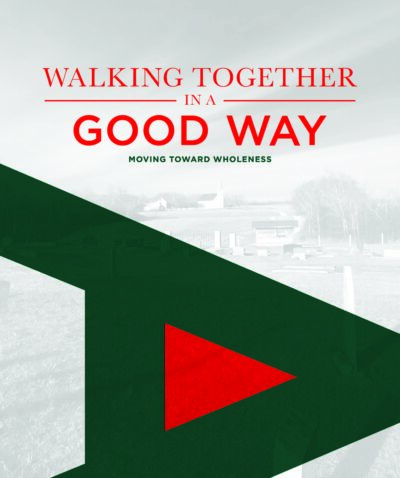First published on:
CBMIN.ORG
WRITTEN BY:
Canadian Baptist Ministries
READING TIME:
5 min read

READ MORE:
This article was from Walking Together in a Good Way.
CBM acknowledges that its head office is situated upon traditional territories of the Mississaugas of the New Credit First Nations (Mississauga Tract, Treaty 19).
AN APOLOGY IN THE MAKING
RESETTING THE RELATIONSHIP
Justice Murray Sinclair stated frequently during the Truth and Reconciliation Commission’s (TRC) work that “Reconciliation is not an Aboriginal problem, it is a Canadian problem. It involves all of us.”
I was asked to issue a formal apology on behalf of Canadian Baptist Ministries. This is in response to one of the clarion calls from the TRC – that churches and mission groups engage in recognition, understanding, peer learning and reconciliation with Indigenous peoples in Canada.
As Christians, we are well aware that apologizing (asking and receiving forgiveness for deeds done or not done) to God and each other is at the heart of the journey to reconciliation. It is something we need to do individually and collectively – and often!
I offered our apology at an Indigenous conference organized by Highland Baptist Church in Kitchener, Ontario, in October 2016. This was a challenging request because of our congregationalist ecclesiology and because CBM is only one of many Baptist partners in our national landscape. I couldn’t speak on behalf of everyone, but I could give a glimpse into the feelings of regret from the people with whom I shared this concern.
To do so, I solicited advice and guidance from the Executive Ministers of the four Canadian Baptist regional denominations. I also enlisted the wisdom of a small group of friends and colleagues who I consider to be leading-edge thinkers in Canada around our social engagement. This team was made up of author Mark Buchanan, Lois Mitchell and Gordon King.
During the summer of 2016, we surveyed over 250 Canadian Baptist pastors and leaders and received 79 responses. We learned that only 27% of the respondents’ churches are involved in Indigenous peoples’ ministries and 94% of them have not discussed the resolutions of the Truth and Reconciliation Commission as a church family.
Finally, in answer to the matter of a national Baptist apology, 91% of the respondents agreed it was necessary, 5% felt it wasn’t necessary and 4% were uncertain. In other words, a resounding majority affirmed the need to proceed with this apology. Wording it required careful and prayerful work. The final version integrates the input I received from across our country and contains the wording, direction and intention of the church leaders interviewed, as opposed to one person’s voice on behalf of a body of believers.
I hope this helps you work through the process if God is calling your church to craft its own apology.
A FORMAL APOLOGY ON BEHALF OF CANADIAN BAPTIST MINISTRIES
Today, I come humbly to this place, on behalf of Canadian Baptist Ministries. Before we seek to Reset the Relationship, as this conference is named, allow me to apologize before God and to you, our Indigenous brothers and sisters, both personally and collectively. I am mindful that I cannot apologize for others’ acts without admitting my own shortcomings. As a community of God’s people, we admit that too often we have not been or done what we could or should have to live and act justly. To you, our neighbours, our sisters and brothers who have been hurt, directly or indirectly by our actions and inaction, we ask your forgiveness.
Canadian Baptists have heard the pain and hurt inflicted upon our country’s Indigenous peoples. We acknowledge the deep wounds that persist as a consequence of our shared history. As a Church body, our early roots were in a white, Colonial past, from both Europe and America. Attitudes and acts of arrogance, entitlement and greed compelled many who settled here in Canada to assume ownership of lands that were not theirs to take, to occupy territories that were unceded and to formulate and sign treaties which were tilted in their own favour. The trust and goodwill of our Indigenous peoples were further abused when we failed to honour the treaties.
Many of our own church roots emerged from the Anabaptist tradition in Europe. Our forefathers suffered forms of persecution and exclusion in Europe, yet we acted in a similar manner here. We went from being excluded to being the excluders, from the oppressed to the oppressors. We failed to learn from our past and fully embrace the “other” when we arrived here, despite the hospitality that was extended to us.
Although Canadian Baptists were not directly involved in the Residential School system, we failed our Indigenous brothers and sisters by not speaking out against it, when your language, culture, religion and values were being assaulted and harm was being inflicted on your children. We sinned when we were not the voice of the oppressed. We looked the other way when wrong was being done. And when some Baptists, like Silas Rand who lived and worked among the Mi’kmaq from 1843 – 1889, challenged the colonial status quo, our churches silenced them.
We put up walls when we should have opened doors. These practices have created a context wherein Indigenous peoples in this land today experience disproportionate poverty and oppression, the result of which are negative stereotypes, high rates of mental and emotional illness, suicide, violence against women, substance abuse and intergenerational pain.